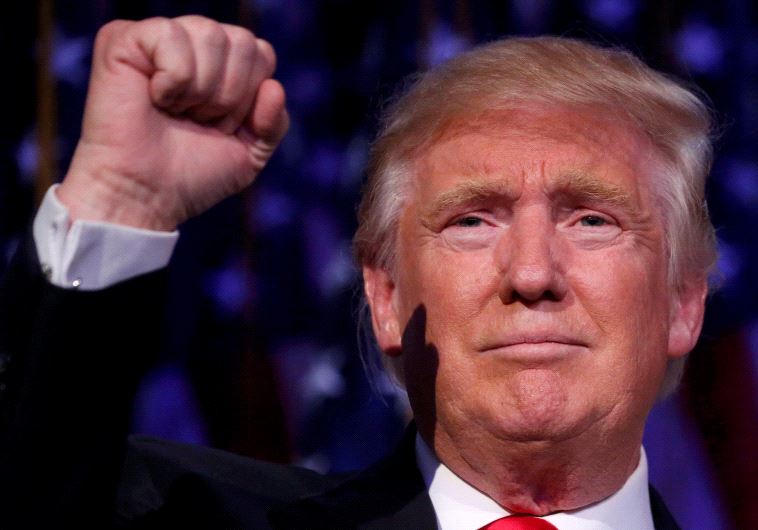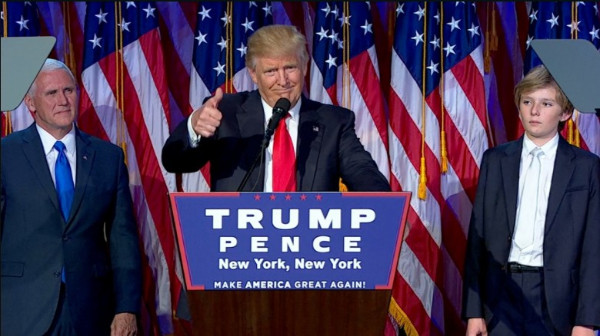Article 2
ANALYSIS: Trump and Israel, now what?
Herb Keinon
Jerusalem Post
The unexpected, improbable, against-the-odds victory Tuesday of Trump over Hillary Clinton undoubtedly shocked Prime Minister Benjamin Netanyahu and Jerusalem as much as it shocked the world.

Donald Trump speaks at his election night rally in Manhattan. (photo credit:REUTERS)
SAN FRANCISCO – “I love Israel and honor and respect the Jewish tradition and it’s important we have a president who feels the same way,” US President-elect Donald Trump said in a pre-recorded video message to a rally held two weeks ago in a restaurant overseeing the Old City.
“My administration will stand side-by-side with the Jewish people and Israel’s leaders to continue strengthening the bridges that connect, not only Jewish Americans and Israelis, but also all Americans and Israelis,” he said. “Together we will stand up to enemies, like Iran, bent on destroying Israel and her people, together we will make America and Israel safe again.”
Now we will see.
The unexpected, improbable, against-the-odds victory Tuesday of Trump over Hillary Clinton undoubtedly shocked Prime Minister Benjamin Netanyahu and Jerusalem as much as it shocked leaders in capitals throughout the world. Now Netanyahu and his aides will have to begin figuring out what exactly it means for Israel.
And that will not be an easy chore, considering that Trump does not have any real practical record on Israel.
While Netanyahu obviously had policy differences with Clinton, at least he knew where she stood and what to expect. Israeli policy-makers, in general, like the predictable; they like to know what they are getting, even if it is not everything they want, because at least in this regard they know how to prepare. Clinton was a known-commodity because she has been involved for so long at a policy level on Israel-related issues. There was a degree of predictability regarding how she would act, and who she could be expected to bring on board her national security team.
No such predictability exists with regard to Trump. He is a blank slate; a wild card.
While during the campaign Trump hit the right rhetorical buttons when it comes to Israel –, though he also raised some eyebrows by talking at one stage about US “neutrality” in the conflict with the Palestinians and at another about the need for US allies to pay more of their share of US military assistance – he has no track record. Being the grand marshall of the Israel Day Parade in Manhattan is commendable, but it is not the same as having dealt over the years with the nitty-gritty of Mideast issues..
That being the case there are certain elements of a Trump presidency that had to have Netanyahu smiling on Wednesday morning.
The first is Trump’s running mate, Mike Pence. The former Indiana governor and congressman is an Evangelical Christian and strong supporter of Israel. He stated at that rally in Jerusalem two weeks ago – shortly after UNESCO voted to expunge any Jewish connection to the Temple Mount – that Jerusalem is the “eternal undivided capital of the Jewish people and the Jewish state.” He called Israel America’s “most cherished ally,” and said that he and Trump stand with Israel because “Israel’s fight is our fight, because Israel’s cause is our cause.” And, unlike Trump, he has a long record of political support for Israel.
Pence is not the only reason Netanyahu is smiling. He is also smiling because the Republicans retained control of both the House and the Senate. During the last eight rocky years of his relationship with Obama, Netanyahu found some solace in having an extremely supportive Congress on his side. And although there was pre-election talk that the Republicans might lose the Senate, that did not transpire.
Netanyahu, who in his more than 10 years as Israeli prime minister has never had the opportunity to work alongside a Republican president, will now get the chance to work not only with a president whose worldview is much closer to his own, but also with a president who will be buttressed by a Republican-held Congress whose support for Israel remains extremely strong.
Netanyahu also had to be smiling because as of January 20 there will be sitting in the White House a man who has trashed the Iranian nuclear deal. Though Trump never promised to scrap the deal, as some other early Republican candidates did, he has been scathing in his criticism of the deal, and he obviously does not have any emotional investment in it that could possibly blind him to Iranian violations.
It is not clear who will make up Trump’s national security team, but it will surely not include those who pushed through the Iranian deal, and are so wedded to that they would do anything to ensure that it succeeds, including overlooking any Iranian behavior that contravenes the agreement.
The prime minister also had to be smiling because groups such as J Street, a Jewish obbying organization that has encouraged Administration pressure on Israel, will lose much of its impact and influence as a result of the election results.
J Street’s influence stems largely from its connections and access to the Administration, whose work if often did.Tellingly, its head Jeremy Ben-Ami borrowed a football metaphor in saying to the New York Times in 2009 that “our No. 1 agenda item is to do whatever we can in Congress to act as the president’s blocking back.”
The job of the “blocking back” is to protect the quarterback. But now that the quarterback has changed, and the playbook will be completely different, the importance of that particular blocking back will be greatly diminished.
Netanyahu has to be smiling as well at some of the names of candidates being bandied about to fill various high profile positions in a Trump administration, first and foremost as the new secretary of state. Among the names being discussed for secretary of state, for example, are former speaker of the House Newt Gingrich, a leading Trump supporter, and former ambassador to the UN John Bolton.
The appointment of either would be loudly applauded in the Prime Minister’s Office, as their outlooks on the region and its threats are very similar to those of Netanyahu. Another leading candidate, current chair of the Senate Foreign Relations Committee Sen. Bob Corker (R-Tennessee), would also be applauded, as he was a leading opponent of the Iran deal.
One of the biggest questions right now is how Trump’s’ election will impact Obama’s decision on what he will do regarding the Mideast in his remaining two and a half months in office.
Four options have been widely discussed: delivering a speech on the Mideast laying down how he sees the parameters of an eventual deal, or supporting one of three moves in the UN. The three UN options include supporting either a new UN Security Council resolution laying new foundations for peacemaking to essentially replace Security Council Resolution 242; not vetoing another attempt by the Palestinians to get the Security Council to approve their admission into the UN as a state; or supporting an anti-settlement resolution.
Netanyahu has said repeatedly that Israel hopes and expects that the US will abide by its long-standing commitment that peace must be reached in negotiations between the two sides, and will not do anything to support an outside imposition of a solution. But there are those who believe that the likelihood that Obama might do something dramatic on the Mideast in his wanting days in office are greater following a Trump victory, than had there been a Clinton one.
Had Clinton won, this argument runs, Obama would have coordinated his final Mideast moves with her, not wanting to take any step that would complicate her relationship with Netanyahu. By the same token, according to this argument, a Trump victory might unleash an urge on Obama’s behalf to take some dramatic step that would tie the next administration’s hands on the issue.
Obama, in his speech Wednesday from the White House Rose Garden, spoke of the importance and need for an orderly transition of power. A dramatic move now on the Mideast, however, would run contrary to that goal, as it would set into stone policies that he knows the incoming administration would oppose.
Finally, the election of Trmp is likely to lead to a continuation and even increased cooperation between Israel and some of its Sunni neighbors, such as Egypt, Jordan, Saudi Arabia and the United Arab Emirates.
What Trump will do in the Mideast is an unknown not only for Israel, but for those countries as well. They, too, do not know the degree to which they can depend on Washington. One of the reasons for the enhanced cooperation between these disparate countries over the last few years has been uncertainty of the degree to which Washington could be relied upon, and fear of a US withdrawal from the region. That insecurity will remain for the time being, at least until Trump’s direction in the region becomes clear.
BACK TO TOP |








